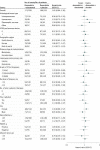Effect of Doxorubicin Plus Olaratumab vs Doxorubicin Plus Placebo on Survival in Patients With Advanced Soft Tissue Sarcomas: The ANNOUNCE Randomized Clinical Trial
- PMID: 32259228
- PMCID: PMC7139275
- DOI: 10.1001/jama.2020.1707
Effect of Doxorubicin Plus Olaratumab vs Doxorubicin Plus Placebo on Survival in Patients With Advanced Soft Tissue Sarcomas: The ANNOUNCE Randomized Clinical Trial
Abstract
Importance: Patients with advanced soft tissue sarcoma (STS) have a median overall survival of less than 2 years. In a phase 2 study, an overall survival benefit in this population was observed with the addition of olaratumab to doxorubicin over doxorubicin alone.
Objective: To determine the efficacy of doxorubicin plus olaratumab in patients with advanced/metastatic STS.
Design, setting, and participants: ANNOUNCE was a confirmatory, phase 3, double-blind, randomized trial conducted at 110 sites in 25 countries from September 2015 to December 2018; the final date of follow-up was December 5, 2018. Eligible patients were anthracycline-naive adults with unresectable locally advanced or metastatic STS, an Eastern Cooperative Oncology Group performance status of 0 to 1, and cardiac ejection fraction of 50% or greater.
Interventions: Patients were randomized 1:1 to receive doxorubicin, 75 mg/m2 (day 1), combined with olaratumab (n = 258), 20 mg/kg in cycle 1 and 15 mg/kg in subsequent cycles, or placebo (n = 251) on days 1 and 8 for up to 8 21-day cycles, followed by olaratumab/placebo monotherapy.
Main outcomes and measures: Dual primary end points were overall survival with doxorubicin plus olaratumab vs doxorubicin plus placebo in total STS and leiomyosarcoma (LMS) populations.
Results: Among the 509 patients randomized (mean age, 56.9 years; 58.2% women; 46.0% with LMS), all were included in the primary analysis and had a median length of follow-up of 31 months. No statistically significant difference in overall survival was observed between the doxorubicin plus olaratumab group vs the doxorubicin plus placebo group in either population (total STS: hazard ratio, 1.05 [95% CI, 0.84-1.30], P = .69, median overall survival, 20.4 months vs 19.7 months; LMS: hazard ratio, 0.95 [95% CI, 0.69-1.31], P = .76, median overall survival, 21.6 months vs 21.9 months). Adverse events of grade 3 or greater reported in 15% or more of total patients with STS were neutropenia (46.3% vs 49.0%), leukopenia (23.3% vs 23.7%), and febrile neutropenia (17.5% vs 16.5%).
Conclusions and relevance: In this phase 3 clinical trial of patients with advanced STS, treatment with doxorubicin plus olaratumab vs doxorubicin plus placebo resulted in no significant difference in overall survival. The findings did not confirm the overall survival benefit observed in the phase 2 trial.
Trial registration: ClinicalTrials.gov Identifier: NCT02451943.
Conflict of interest statement
Figures



Comment in
-
Treatment for Advanced Soft Tissue Sarcoma: An Informative Neutral Trial.JAMA. 2020 Apr 7;323(13):1251-1252. doi: 10.1001/jama.2020.0567. JAMA. 2020. PMID: 32259216 Free PMC article. No abstract available.
References
-
- Seddon B, Strauss SJ, Whelan J, et al. Gemcitabine and docetaxel versus doxorubicin as first-line treatment in previously untreated advanced unresectable or metastatic soft-tissue sarcomas (GeDDiS): a randomised controlled phase 3 trial. Lancet Oncol. 2017;18(10):1397-1410. doi: 10.1016/S1470-2045(17)30622-8 - DOI - PMC - PubMed
-
- Judson I, Verweij J, Gelderblom H, et al. ; European Organisation and Treatment of Cancer Soft Tissue and Bone Sarcoma Group . Doxorubicin alone versus intensified doxorubicin plus ifosfamide for first-line treatment of advanced or metastatic soft-tissue sarcoma: a randomised controlled phase 3 trial. Lancet Oncol. 2014;15(4):415-423. doi: 10.1016/S1470-2045(14)70063-4 - DOI - PubMed
Publication types
MeSH terms
Substances
Associated data
Grants and funding
LinkOut - more resources
Full Text Sources
Other Literature Sources
Medical

